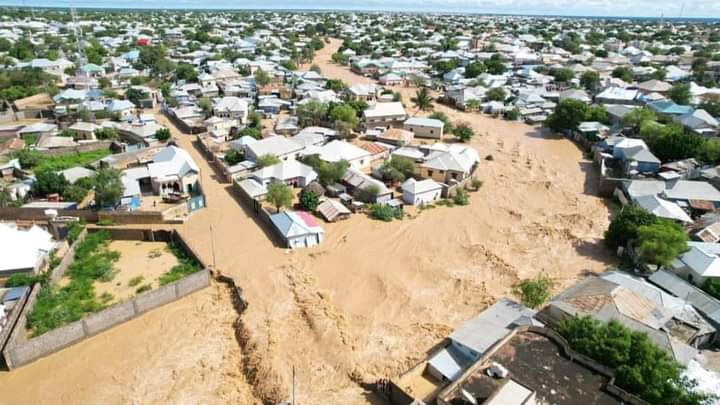YOU ARE HERE
»
Home
»
Admin ASWDNet
»
Flooding Crisis in Baidoa, Somalia – Collaborative Efforts Needed

Flooding Crisis in Baidoa, Somalia – Collaborative Efforts Needed
by Mohamed Abdulahi Abshir, Somalia
The situation in Baidoa is dire, with significant disruptions to daily life. Individuals, such as car drivers and house builders, have been unable to work for the past five days due to heavy rainfall and flooding. This has resulted in elevated market prices, damaged roads, and overall challenges in the affected areas.
While the conditions are starting to normalize, it is crucial to address the root causes of such disasters and work collaboratively to prevent future occurrences. Here are some key factors contributing to the flooding in Baidoa:
Geography and Climate
Baidoa’s location in a region prone to heavy rainfall and its proximity to the Shebelle River make it susceptible to seasonal flooding.
Deforestation and Land Degradation
The clearing of forests for various purposes has reduced the natural water retention capacity of the land, leading to increased flood risks.
Urbanization and Poor Infrastructure
Rapid urbanization without proper planning and infrastructure has exacerbated the flooding problem, with unplanned settlements and inadequate drainage systems hindering water flow.
Poverty and Informal Settlements
Poverty and the growth of informal settlements contribute to the vulnerability of the population, as many residents live in low-income housing with limited access to basic services.
Climate Change
The impacts of climate change, including altered precipitation patterns and rising global temperatures, contribute to the frequency and intensity of extreme weather events such as heavy rainfall and flooding.
Conflict and Displacement
Prolonged conflict and instability have led to internal displacement, with displaced populations settling in vulnerable areas, increasing their susceptibility to flooding.
The loss of life during floods can be attributed to factors such as insufficient early warning systems, lack of infrastructure and emergency preparedness, high population density, and limited access to healthcare services.
Comprehensive approach is required
To address these challenges, a comprehensive approach is required. This includes improving early warning systems, investing in infrastructure development, implementing effective emergency preparedness measures, and ensuring access to healthcare services during and after floods. Community education and awareness programs are also crucial for promoting flood resilience.
Food support
The efforts of the Baidoa District Administration and the Southwest Flood Emergency Committee are commendable. Distributing food donations to the people affected by the floods shows their commitment to providing immediate relief and support to those in need.
Floods can have devastating effects on communities, causing displacement, damage to infrastructure, and food insecurity. By providing food donations, the authorities are addressing one of the most basic and immediate needs of the affected individuals and families.
Such initiatives are crucial in times of crisis, as they help in alleviating the suffering of the vulnerable populations and contribute to their overall well-being. It’s heartening to see the government and relevant committees working together to provide assistance to the affected people in Baidoa.
Efforts like these not only provide immediate relief but also demonstrate the importance of preparedness and proactive measures to mitigate the impact of natural disasters. By responding swiftly and effectively to such situations, the authorities can help communities recover and rebuild their lives more quickly.


Long-term solutions
It’s important to continue supporting and advocating for initiatives that address the needs of those affected by natural disasters, as well as investing in long-term solutions to enhance resilience and disaster preparedness in the region.
About author
Mohamed Abdulahi Abshir is the Founder of Southwest Somali Association and is a Member of Africa Social Work Network (Aswdnet)
As the Founder of Southwest Somali Association and a member of the Africa Social Work Network (Aswnet), I believe in the power of collaborative efforts. I am reaching out to you for support and collaboration in addressing the socio-economic causes of flooding in Baidoa. Together, we can implement sustainable land management practices, afforestation efforts, improved urban planning, resilient infrastructure development, poverty alleviation measures, and climate change adaptation strategies.

Use the form below to subscibe to Owia Bulletin.
Discover more from Africa Social Work & Development Network | Mtandao waKazi zaJamii naMaendeleo waAfrika
Subscribe to get the latest posts sent to your email.




I feel sorry for the losses of the Somali people. Although natural disasters cannot be avoided, managing them in some micro ways can reduce the losses. Although many countries have managed these natural disasters well, developing countries still fail to deal with them. Many Indian villages have become water-self-sufficient villages by using it properly. Also, water storage systems and drainage systems should be set up in every village. Also, a disaster rescue team should be formed in every village to deal with disasters, and the youth of that village should come forward and participate in this rescue team. The country’s government should learn the methods of carrying out and managing this along with many developed countries and spread it through the youth. It can be easily handled if every youth comes forward and does this. Also, the structure of a village should include all kinds of basic facilities. These systems help to provide water to the people during drought. Indian rainwater harvesting systems drainage systems individual suction pipe systems, water storage systems, and properly maintained ponds and lakes can easily save people from these types of natural calamities.